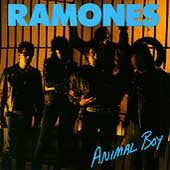
Album: R.E.M., Chronic Town, 1982
Best Song: "Stumble"
Lasting Memory: Early R.E.M. was a revelation--a bolt of Americana lightning from a clear blue sky.
So, of course, I didn't pick up the band's 1982 debut EP until 1988, and even only then under duress. I'm always late to the party, and I only arrive after having taken a wrong turn.
An hour after I won my high school's local league heavyweight wrestling crown, my family car stalled out while I was driving home from the tournament. Stranded a dozen miles from my home and in the parking lot of one of Tidewater's foremost music stores, Tracks at Ward's Corner, I called my dad and headed for the $1.99 cassette bin.
Purchasing R.E.M.'s Chronic Town was my true victory of that late February day. I am pleased that I earned a sports title to add to my lifetime resume, and I'm grateful to this day that my father was willing to drive out and rescue me. But I'm karmicly indebted to that shitty Ford Fairlane for forcing me to be in a position to pick up Chronic Town.
Of all of R.E.M.'s 14 albums, Chronic Town is my favorite because it is both charmingly unpolished and a précis on what the band from Athens, Ga., would go on to accomplish.
It bears noting--which I will fail to do in the course of my next seven posts--that what R.E.M. went on to accomplish was taking over the world by making the U.S. airwaves safe for alternative music.
The open secret to R.E.M.'s success is that, following the Who and sometimes the Kinks, lead singer Michael Stipe and guitarist Peter Buck allowed bassist Mike Mills to take the rhythm and melody lines of the band's songs. This not-exactly innovation makes "Wolves, Lower" and "Carnival of Sorts (Box Cars) " instant classics.
It also helps to sell R.E.M.'s music when the vocals are mixed way below the instruments. The band would break from this style dramatically on the album that inevitably made me fall out of love with the group whose drummer used to be Bill Berry.
But, good grief, who could resist the siren call of the half-Byrds and half-Velvet Underground anthem that is "Stumble"?
Up Next: R.E.M., Murmur, 1983




